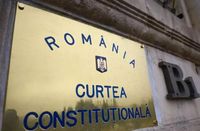The results of the first round of the 2025 presidential elections in Romania are sending a clear message to the Republic of Moldova about electoral preferences and identity politics. With over 90,000 votes cast across 64 polling stations opened beyond the Prut River, Romanian citizens from Moldova expressed their preferences in a manner that starkly contradicts the public calls from the ruling party in Chisinau. This election not only highlights dissatisfaction but also hints at a potential for reunification with Romania, challenging the current government’s narrative.
One of the most controversial and significant outcomes in Moldova was the third-place finish of AUR leader George Simion, who garnered over 11,000 votes—twice the result he achieved with Calin Georgescu in last year’s first round. Paradoxically, Simion, who has been banned from entering Moldova multiple times and declared a persona non grata by the authorities, managed to achieve substantial support in a territory where he was officially prohibited from stepping foot. This situation speaks volumes about the disconnect between voter expectations and institutional judgments in Moldova.
As the political landscape becomes increasingly polarized, the sovereignist candidate has emerged as a catalyst for anti-systemic discontent. His nationalistic and aggressive rhetoric has attracted voters precisely where the ruling party (PDS) and the pro-European government have left a void in the discourse regarding identity and a decisive stance on relations with Romania.
So, why did Moldovans vote differently this time? The numbers tell a compelling story: out of 90,851 votes cast, 52.63% went to Nicușor Dan, a candidate perceived as a technocrat with a moderate anti-system image, followed by Crin Antonescu (21.69%) and George Simion (12.47%). Elena Lasconi, who recently led the USR in Romania, received only 9.6%, a significant drop from her previous 55%, indicating that Moldovan voters’ preferences are fluid and do not mechanically align with the directions imposed by the Chisinau authorities.
Moldovan voters with Romanian citizenship, displaying political and electoral activity, sent a dual signal: on one hand, loyalty to Romanian and European ideals (with pro-European candidates receiving 75,000 votes), and on the other, a clear distrust of the PDS as a self-proclaimed political force and 'bearer of Europeanism'. This voting behavior also serves as a symbolic indictment of the façade of Moldovanism promoted by the current government, which lacks clarity in identity.
Who are these voters? This segment of the electorate is among the most politically active and possesses the clearest Romanian identity among citizens of Moldova. They represent not only a statistically significant group but also a symbolically defining one for the relationship between the two banks of the Prut River. This electorate forms the basis of a truly pro-European and unionist option, comprising citizens who vote based on deep principles of identity and geopolitical conviction rather than circumstantial factors.
The presidential elections in Romania confirm a reality: Romanians from Moldova can no longer be viewed as a mass for political maneuvering. They demand consistent projects, a vision of identity, and geopolitical responsibility. The good result for Nicușor Dan, viewed as a political figure outside the traditional spectrum, reflects a desire for a clean alternative that has not compromised itself, as well as a meaningful rapprochement with Romania.
For pro-European forces in Moldova, this reality serves as a wake-up call. If they do not establish a credible, unified, and active pro-Romanian pole of attraction, they risk losing the very segment of the electorate that brought them victory in previous elections. The upcoming autumn parliamentary elections will be a decisive test, not just for the PDS but for the entire pro-European ruling paradigm.
In conclusion, the presidential elections in Romania are not merely about who will occupy the Cotroceni Palace. They reflect a tectonic shift in the approach of the Romanian electorate from Moldova. This voting is more than a democratic exercise; it is a demonstration of clarity in identity, a manifestation of political dissatisfaction, and a desire to change the configuration of relations with Romania. The lesson is clear: the sovereignty of the Republic of Moldova cannot be protected by strategic silence and imitated neutrality. It is safeguarded through courage and the assumption of responsibility for its existential destiny within the larger family of European Romanians.
In a related development, the Constitutional Court of Romania on May 9 rejected the appeal of candidate Sebastian Popescu, who sought to invalidate the voting results from May 4, 2025. The court unanimously confirmed the legality of the elections, paving the way for the second round scheduled for May 18, 2025, where George Simion and Nicușor Dan will compete for the presidency.
Popescu, a candidate from the 'New Romania' party, claimed that both leaders used unfair methods of promotion on social media, distorting the will of the voters. However, the court found his appeal unfounded. The results of the first round showed Nicușor Dan leading with 20.99% and Crin Antonescu following closely with 20.07%. With 9.57 million people voting, or 53.19% of registered voters, the elections saw 98.52% of ballots recognized as valid.
This decision by the Constitutional Court not only affirms the legitimacy of the electoral process but also signals the beginning of an intense campaign ahead of the second round, where the stakes are high for both candidates as they vie for the presidency.






